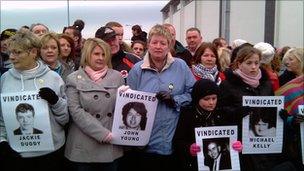'Last' Bloody Sunday march takes place in Derry
- Published
Thousands of people have marched in what is intended to be the last Bloody Sunday march in Londonderry.
The marchers started from the Creggan area walking behind a banner carried by the families which read "vindicated".
They completed the route begun in 1972 - the march usually stops at Free Derry Corner, but instead went all the way to the Guildhall.
Organisers said they believe the annual event should come to an end following the publication of the Saville Report.
A statement said the protest was no longer necessary after the inquiry exonerated those who died in the 1972 Bloody Sunday shootings.
It was signed by the majority of the victims' families.
However, some relatives of the victims have called the proposal premature.
They broke off from the parade at William Street and finished their march at Free Derry corner.
Earlier, hundreds gathered at the monument for the wreath-laying on the first Bloody Sunday anniversary since the publication of the Saville Report.
Prayers and a minute's silence were offered for the dead, wounded and the relatives.

Many of the victims' families believe the time has come for the annual march to end
Among those speaking during the ceremony was the Reverend David Latimer from First Derry Presbyterian Church.
He spoke of a new era for good relations in the city. As light snow fell the wreaths were placed on the monument and the names of all the victims were read out.
Demonstration
Fourteen people lost their lives on 30 January 1972 when British paratroopers opened fire on a civil rights march in Derry's Bogside area.
Kate Nash, whose brother William was killed on Bloody Sunday, said she felt the decision to end the march was "very premature".
She added: "It was dropped on us like a ton of bricks, completely unexpectedly. Who decided the march should end and why?
"The people of Derry were not afforded the opportunity of having an opinion about this and I feel they should have had."
Tony Doherty, whose father Paddy was also killed on Bloody Sunday, said he supported the ending of the march.
He added: "The vast majority of the families felt that what we had brought about, what we had achieved on 15 June, with the Saville Report as an exoneration, with the words of David Cameron, with apology and accepting political responsibility for the atrocity of Bloody Sunday, that it was now time for us all to consider moving on."
A number of options are now being considered to mark future anniversaries, including an annual gathering of remembrance at the Bloody Sunday monument, a remembrance Mass, a human rights weekend and an annual Bloody Sunday lecture.
- Published29 January 2011
- Published31 December 2010
- Published15 June 2010